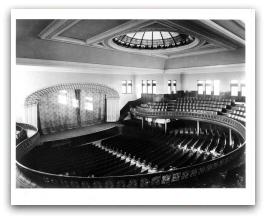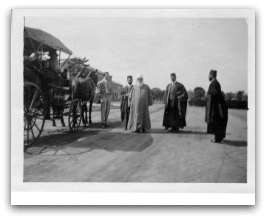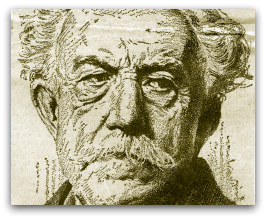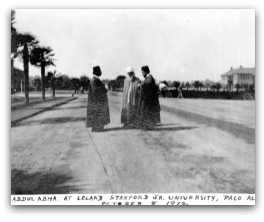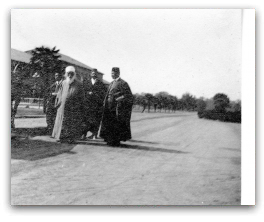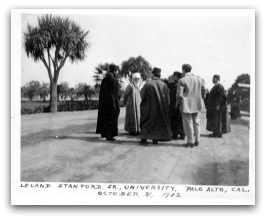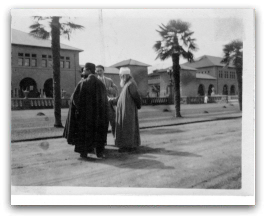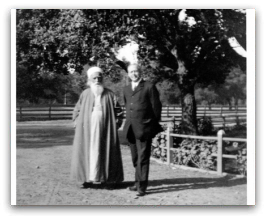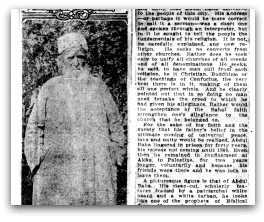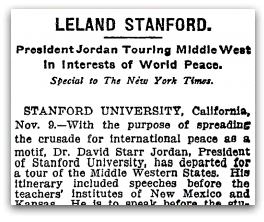Main menu
- ‘Abdu’l-Bahá’s Journey
- World Peace
- Stopping Racism in America
- Empowerment of Women
- More Principles...
- Prayer for America
Palo Alto
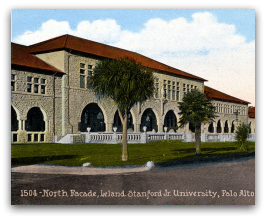
‘Abdu’l-Bahá arrived in San Francisco in the early morning hours of October 3, 1912. Even prior to His arrival, the Bay Area newspapers reported that arrangements had been made for Him to speak at Stanford University, in Palo Alto. David Starr Jordan, the President of Stanford, called on ‘Abdu’l-Bahá in San Francisco, and formalized arrangements for ‘Abdu’l-Bahá to address the entire student body and faculty of the University, on the morning of October 8th. Later, arrangements were made with the pastor of the Unitarian church in Palo Alto, for ‘Abdu’l-Bahá to address his congregation on the same evening.
President Jordan introduced ‘Abdu’l-Bahá:
It was surely a remarkable scene as ‘Abdu’l-Bahá addressed this gathering, in one of the world’s finest educational institutions. ‘Abdu’l-Bahá, who had never attended school in His life, stood on the stage of the Assembly Hall before the nearly 2000 people in this illustrious audience, speaking to them in a language they would understand: The language of science. He began His address with these words:“It is our portion to have with us, through the courtesy of our Persian friends, one of the great religious teachers of the world, one of the natural successors of the old Hebrew prophets. He is said sometimes to be the founder of a new religion… . It is not exactly a new religion, however. The religion of brotherhood, of good will, of friendship between men and nations - that is as old as good thinking and good living may be. It may be said in some sense to be the oldest of religions… I have now the great pleasure, and the great honor also, of presenting to you ‘Abdu’l-Bahá.”
“The greatest attainment in the world of humanity has ever been scientific in nature. It is the discovery of the realities of things. Inasmuch as I find myself in the home of science—for this is one of the great universities in the country and well known abroad—I feel a keen sense of joy.
“The highest praise is due to men who devote their energies to science, and the noblest center is a center wherein the sciences and arts are taught and studied. Science ever tends to the illumination of the world of humanity… ”
Then He developed His central theme: That the scientific faculty in the human being is divine in origin, and that the station of the human being is very great. If the lower conditions of existence, at the atomic and cellular levels, can exist in harmony, how much more important that the loftiest of God’s creations, the human beings that populate the planet, live in unity.
“As this is true of material phenomena, how much more evident and essential it is that oneness should characterize man.”
“Considering this wonderful unity of the kingdoms of existence and their embodiment in the highest and noblest creature, why should man be at variance and in conflict with man? Is it fitting and justifiable that he should be at war, when harmony and interdependence characterize the kingdoms of phenomenal life below him? The elements and lower organisms are synchronized in the great plan of life. Shall man, infinitely above them in degree, be antagonistic and a destroyer of that perfection? God forbid such a condition!”
“A physical clash, a little quarreling among the elements as it were, and a violent cataclysm of nature results. This happens in the mineral kingdom. Consider, then, the effect of discord and conflict in the kingdom of man, so superior to the realm of inanimate existence. How great the attendant catastrophe, especially when we realize that man is endowed by God with mind and intellect.”
“It is neither seemly nor befitting that such a noble creature, endowed with intellect and lofty thoughts, capable of wonderful achievements and discoveries in sciences and arts, with potential for ever higher perceptions and the accomplishment of divine purposes in life, should seek the blood of his fellowmen upon the field of battle.”
“God created one earth and one mankind to people it.”
Mirza Mahmud, ‘Abdu’l-Bahá’s chronicler, stated that when ‘Abdu’l-Bahá’s address was concluded, “the entire audience was overcome with admiration. The applause shook the building to its very foundation.”
Following the address, ‘Abdu’l-Bahá was interviewed by a reporter from the student newspaper. He was also the luncheon guest of David Starr Jordan at his residence, Xasmin House.The local newspaper, The Palo Altan, published a special edition entirely devoted to ‘Abdu’l-Bahá’s visit to Northern California, and containing the text of several of His addresses, including both of His addresses delivered in Palo Alto. The front page of that remarkable newspaper contains a detailed description of ‘Abdu’l-Bahá’s visit to Palo Alto, while others contain the full text of His addresses at Stanford University and the Unitarian Church in Palo Alto.
That evening, in introducing ‘Abdu’l-Bahá at the Unitarian Church, Clarence Reed, the pastor of that church said, “It is a great privilege to have with us tonight one who calls himself a “servant of God,” and one who also is a great lover of mankind. ‘Abdu’l-Bahá.”‘Abdu’l-Bahá spoke to the congregation about the reality of Divinity. He then said,
“It is our duty to praise God and to thank Him that He has created all of us human. He has endowed us all with sight and hearing. He has destined us all to be after the image and likeness of God. What a bestowal is this! What a providence is this! What a glorious crown is this! Why should we lose these favors? Why should we be so self-occupied? Why should we deny the favors of God? In thanksgiving for this glorious bounty we must all become unified as one family. We must all become as one people. We must all inhabit the same nativity. We must all become as one nation.”
Today Bahá’ís promote the oneness of humanity in a coherent manner in more than one hundred thousand Bahá’í communities worldwide. Through courses of study and application of the Writings of Bahá’u’lláh, through the delivery of courses of moral and spiritual instruction to children and youth, and through devotional gatherings open to the followers of all faiths, we channel the divine energies expressed through the Bahá’í Revelation into practical steps for “the regeneration of the whole world, and the establishment of the unity of its peoples.”





